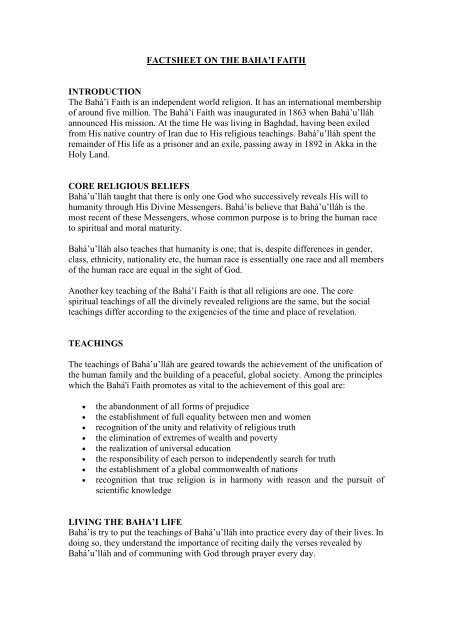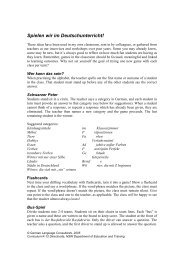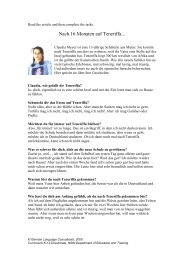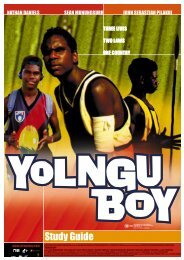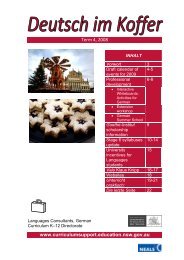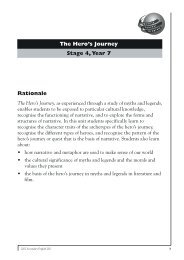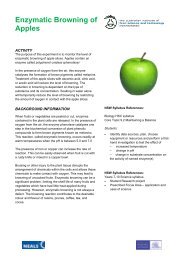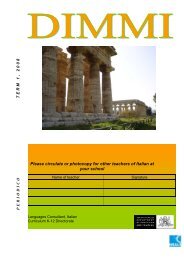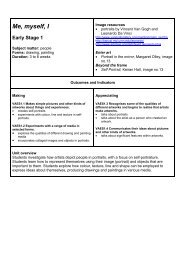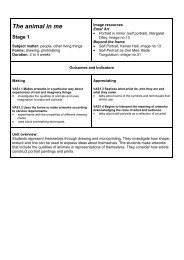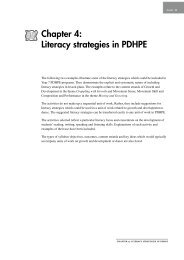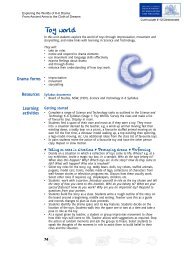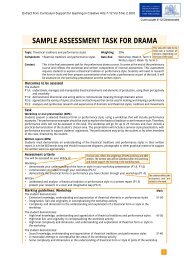Bahá'í (pdf - 16kb) - Curriculum Support
Bahá'í (pdf - 16kb) - Curriculum Support
Bahá'í (pdf - 16kb) - Curriculum Support
You also want an ePaper? Increase the reach of your titles
YUMPU automatically turns print PDFs into web optimized ePapers that Google loves.
FACTSHEET ON THE BAHA’I FAITH<br />
INTRODUCTION<br />
The Bahá’í Faith is an independent world religion. It has an international membership<br />
of around five million. The Bahá’í Faith was inaugurated in 1863 when Bahá’u’lláh<br />
announced His mission. At the time He was living in Baghdad, having been exiled<br />
from His native country of Iran due to His religious teachings. Bahá’u’lláh spent the<br />
remainder of His life as a prisoner and an exile, passing away in 1892 in Akka in the<br />
Holy Land.<br />
CORE RELIGIOUS BELIEFS<br />
Bahá’u’lláh taught that there is only one God who successively reveals His will to<br />
humanity through His Divine Messengers. Bahá’ís believe that Bahá’u’lláh is the<br />
most recent of these Messengers, whose common purpose is to bring the human race<br />
to spiritual and moral maturity.<br />
Bahá’u’lláh also teaches that humanity is one; that is, despite differences in gender,<br />
class, ethnicity, nationality etc, the human race is essentially one race and all members<br />
of the human race are equal in the sight of God.<br />
Another key teaching of the Bahá’í Faith is that all religions are one. The core<br />
spiritual teachings of all the divinely revealed religions are the same, but the social<br />
teachings differ according to the exigencies of the time and place of revelation.<br />
TEACHINGS<br />
The teachings of Bahá’u’lláh are geared towards the achievement of the unification of<br />
the human family and the building of a peaceful, global society. Among the principles<br />
which the <strong>Bahá'í</strong> Faith promotes as vital to the achievement of this goal are:<br />
• the abandonment of all forms of prejudice<br />
• the establishment of full equality between men and women<br />
• recognition of the unity and relativity of religious truth<br />
• the elimination of extremes of wealth and poverty<br />
• the realization of universal education<br />
• the responsibility of each person to independently search for truth<br />
• the establishment of a global commonwealth of nations<br />
• recognition that true religion is in harmony with reason and the pursuit of<br />
scientific knowledge<br />
LIVING THE BAHA’I LIFE<br />
Bahá’ís try to put the teachings of Bahá’u’lláh into practice every day of their lives. In<br />
doing so, they understand the importance of reciting daily the verses revealed by<br />
Bahá’u’lláh and of communing with God through prayer every day.
There are no clergy in the Bahá’í Faith. Elected bodies of lay believers look after the<br />
affairs of the community at local, state, national and international levels. These bodies<br />
perform some of the roles traditionally associated with clergy in other religions.<br />
Bahá’í administration at all levels function on the principle of consultation. In<br />
essence, consultation seeks to build consensus in a manner that unites people instead<br />
of dividing them. It encourages diversity of opinion and acts to control the struggle<br />
for power that is otherwise so common in traditional decision-making systems.<br />
In their personal lives, Bahá’ís try as much as possible to uphold the high moral<br />
standards called for in their teachings such as abstaining from backbiting, alcohol,<br />
drugs and premarital sex.<br />
FESTIVALS AND HOLY DAYS<br />
Bahá’ís observe eleven holy days each year. The most important Festival is Ridván, a<br />
twelve-day period in April/May that commemorates Bahá’u’lláh’s declaration of His<br />
mission. The holy days are commemorated with community gatherings for prayer,<br />
reflection, and fellowship. On nine of these holy days, Bahá’ís abstain from work.<br />
These Holy Days are as follows:<br />
Name<br />
Gregorian Dates<br />
Work<br />
Suspended<br />
Naw Rúz (<strong>Bahá'í</strong> New Year) March 21<br />
Yes<br />
First day of Ridván April 21 Yes<br />
Ninth day of Ridván April 29 Yes<br />
Twelfth day of Ridván May 2 Yes<br />
Declaration of the Báb May 23 Yes<br />
Ascension of Bahá’u’lláh May 29 Yes<br />
Martyrdom of the Báb July 9 Yes<br />
Birth of the Báb October 20 Yes<br />
Birth of Bahá’u’lláh November 12 Yes<br />
Day of the Covenant November 26 No<br />
Ascension of Abdu’l-Bahá November 28 No<br />
Bahá’ís observe an annual period of fasting from 2 to 20 March, in the lead-up to the<br />
Bahá’í new year. The fast involves abstaining from food and drink from sunrise to<br />
sunset. There are exemptions for those who are sick or elderly, or who cannot fast for<br />
other reasons.<br />
THE BAHÁ’Í FAITH IN AUSTRALIA<br />
In 1920, Englishman John Henry Hyde Dunn, and his English-Irish wife, Clara,<br />
arrived in Australia from the United States, where they had both emigrated. They<br />
were the first Bahá’ís to settle in this country.
In 1922 the first Australians joined the Bahá’í Faith. They were Oswald Whitaker, a<br />
Sydney optometrist, and Effie Baker, a Melbourne photographer.<br />
Soon Bahá’í groups sprang up around the country. By 1934 there were enough<br />
Bahá’ís to elect a national governing body, the first National Spiritual Assembly of<br />
the Bahá’ís of Australia and New Zealand (New Zealand later formed its own<br />
National Spiritual Assembly).<br />
In 1955 Fred Murray of South Australia was among the first Aboriginal people to<br />
become a Bahá’í.<br />
Today, there are over 17, 000 Bahá’ís in Australia, including about five thousand in<br />
New South Wales and ACT. Bahá’ís are actively engaged in neighbourhood<br />
community development activities that are open to all, regardless of faith or<br />
background. This includes providing spiritual empowerment programs for junior<br />
youth aged 11-14, spiritual education classes for children, gatherings that strengthen<br />
the devotional life of the community, and study circles on spiritual themes.<br />
New South Wales is also home to Australia’s only Bahá’í Temple, which is located at<br />
Ingleside overlooking Sydney’s northern beaches. Opened in 1961, the Bahá’í Temple<br />
is a place of prayer and meditation that welcomes visitors of all backgrounds.<br />
CONTACT<br />
This information sheet has been produced by the Bahá’í community of New South<br />
Wales and the Australian Capital Territory. For further information please contact:<br />
Bahá’í Council for NSW & ACT<br />
107 Derby St<br />
Silverwater, 2128<br />
Tel: 02 9748 1297<br />
Fax: 02 9748 4223<br />
Email: abc@nsw.bahai.org.au<br />
Web: www.bahai.org.au


